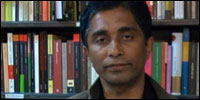 [TamilNet, Sunday, 26 February 2012, 10:53 GMT]
[TamilNet, Sunday, 26 February 2012, 10:53 GMT] “The US support given to UNHRC’s proposal for an accountability mechanism for Sri Lanka would not go beyond requesting GoSL to implement LLRC recommendation which legitimised war to protect the state and reduced human rights violations to the ‘misbehaviour ‘of individual soldiers,” writes Jude Lal Fernando, academic of the Trinity College, Dublin. Establishing what took place was not mere war crimes or crimes against humanity but was intended genocide by Sri Lankan state, and arguing why justice will not come from the powers that conceal the truth and stifle justice and recovery, the academic who was earlier involved in the Dublin Tribunal urges alternative international community to pursue an international independent accountability mechanism.

Jude Fernando is a lecturer and a post-doctoral researcher in peace studies at Trinity College, Dublin.
In his paper, he identifies the ideological markers of the UN panel report, thinking in the US/UK/EU and the orientation of the international human rights organisations such as the Human Rights Watch and International Crisis Group as limited, and observes that the scope for justice coming from them would also be limited.
Pointing out that there is not much difference between the rationale behind the findings and recommendations of the LLRC and the ideological markers of the forces mentioned above, Dr Fernando observes that war crime paradigm lacking historical perspective would only lead to not addressing the root cause of the conflict, to reduce the truth about mass atrocity into a mere breakdown of law and order, and to confine recovery of the victims to undefined political solution under the existing unitary state structure.
In recovering truth about mass atrocity in Sri Lanka it is of paramount importance to go beyond a single state-lens, he observes.
Asking a question, whether it is the specific intent of the GoSL or the strategic interests of global powers that dismantled the parity of esteem between the parties, and indicting SL government for the Tamil genocide and the IC for the complicity, Jude Fernando says that there is a deliberate attempt by the powers who are culpable for crimes against peace to conceal the truth and stifle justice and recovery.
He cited the recent statement of visiting US official Otero in Colombo that had softened and twisted even the phrase war crimes into ‘wartime abuses’.
Commenting on Jude Fernando’s paper, a new generation Eezham Tamil politician said: “In war and postwar the partners have the same aim. Only the tactics of deception differs. But the irony is that when a Sinhala academic like Jude Fernando, seeing the deception in the so-called international community, calls for alternative action to get justice, the Tamil National Alliance wants the Eezham Tamils not to do anything, but to remain calm.”
“Jude Fernando’s detailed discussions establishing theoretical and historical perspectives of genocide in the island are a must to be read by everyone involved in the discourse on the conflict in the island. The paper especially enlightens Tamil polity of the demands it should make, directions it should take and against which forces its struggle should be waged, the new generation Tamil politician further said.

